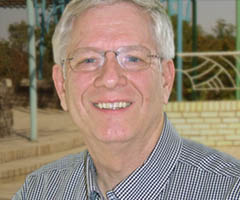Max Gibbs
Max’s story
During much of his life, Max has worked in the Grand Rapids area as a teacher, counselor and administrator in the public and Catholic schools. He has also spent more than a decade as director of Sandy Pines RV Resort.
With four sons and sons-in-law and six grandsons, Max thought of them when he saw the notice of a meeting for those interested in being involved in a clinical trial to prevent prostate cancer.
“I thought, I don’t want to get prostate cancer, I don’t want my kids to get it, so if I feel that way, I need to step up and do something to help.” He went to the meeting.
“I decided, I need to do this, I need to further the cause of eliminating prostate cancer.”
Clinical Trials
Max became one of more than 35,500 healthy men who, beginning in 2001, participated in a prevention trial studying the use of Selenium and Vitamin E in the prevention of prostate cancer.
His was a double-blind trial: Neither study participants nor those running it knew who would receive which combinations of the two agents, together, separately or not at all. Some received a placebo (inactive) substance.
In October, 2008 results showed that Selenium and Vitamin E did not prevent or decrease the incidence of prostate cancer. The active phase of the study ended. Max is now in the followup phase, which will last 2 to 5 years. That phase, which encourages yearly prostate check-ups, will explore whether there are any long-term benefits or side effects to these supplements and how many men in the study might develop prostate cancer or other kinds of cancers, explained Nora Galvin, his research nurse coordinator.
Although the prostate cancer prevention trial did not produce a magic bullet to prevent or decrease the incidence of prostate cancer, it has made a difference to Max, and it has answered questions, allowing researchers to focus in other directions. It also could have benefits yet unseen.
“It was a clinical trial, and not all trials come out the way we hope they will,” Max says. “That’s why they call it a clinical trial.
“We need to do what we can do to further the stopping of cancer. Some trials will be 100 percent successful, some 50 percent."
“There’s nobody in research who comes to work every day saying, ‘What can I fail at today?’ They need our help because microscopes and labs only do so much, then they have to come out to real people to see what will work.”
Max continues to volunteer in prevention trials which involve people who have never had chemotherapy.
Life now
Like all the other men enrolled in the study, Max began the trial never having had prostate cancer. He remains cancer-free, and sees his doctor yearly for check-ups and tests.
Getting into that routine was a pattern the clinical trial established in his life. “That was the beautiful part of it,” he says.
“Now I continue that. It gives me peace of mind. I’m not one to worry about what’s going to happen; even if it shows up someday, you have to plug along and do what you can.”
Max spends more time looking out than looking in:
He is a member of the Salvation Army Advisory Board. He and his wife, Jan, help with Kids Food Basket, a program attacking childhood hunger by delivering sack suppers to thousands of kids; they have volunteered for the American Cancer Society’s Relay for Life; and they help at Hope Lodge, a home-away-from home for adult cancer patients and their caregivers who must travel to Grand Rapids for treatment. It provides free lodging and transportation to and from cancer treatment centers.
A man whose father, mother-in-law and many friends have died of cancer, Max remains a passionate advocate of clinical trials.
“To protect the next generation from cancer, we must work now for a cure."

Max Gibbs
Cancer Prevention

